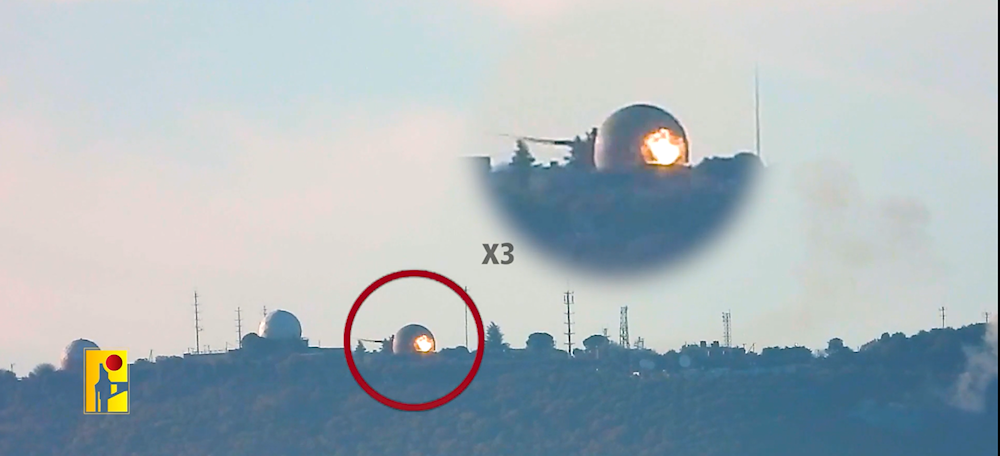'Meron' saga continues: Iron Dome inapt against Hezbollah’s Kornet EMs
Israeli media raise concerns that the Israeli occupation army has no solution for Hezbollah's Kornet EM with a 10km range used to strike the "Meron" air control and surveillance base.
-

Smoke rising from Israeli advanced military hardware in "Meron" air control and surveillance base after it was struck by a guided missile launched by Hezbollah from Lebanon, on Saturday, November 6, 2024 (Hezbollah Military Media)
Israeli media outlets pointed out on Sunday that the Israeli army's "Meron" air control and surveillance airbase was targeted by Hezbollah with an advanced version of Kornet missiles with an effective range of up to 10 km.
The media outlets warned that the Iron Dome, the entity's state-of-the-art anti-air system, is not designed to deal with this type of threat, cautioning that the Israeli army must find solutions to address this issue.
Israeli media also reported that the army opened an investigation into the attack in an attempt to limit similar incidents and failures, adding that it had admitted to the same damages Hezbollah reported yesterday.
The "Meron" base is one of the most strategic centers for the entire Israeli entity and the primary intelligence and military command hub on the northern front.
Read more: Israeli settlers fear new kind of war with Hezbollah: Washington Post
Situated atop Mount Jarmaq, the highest peak in occupied Palestine, the base is around 8km from the Lebanese borders.
It is the sole facility responsible for managing and controlling air operations toward Syria, Lebanon, Turkey, and Cyprus, as well as the northern part of the eastern Mediterranean Sea basin. Moreover, the base acts as a central hub for electronic warfare interference in the mentioned directions, staffed by a significant number of elite Israeli officers and soldiers.
The Islamic Resistance in Lebanon Hezbollah announced on Saturday morning striking the base with 62 missiles and rockets, noting that this is the "initial response" to the Israeli assassination of Hamas' senior leader Shiekh Saleh al-Arouri and his companions earlier this week in Beirut's Southern Suburb.
Footage revealed that "Meron" was targeted with a number of guided missiles, later identified as the enhanced Kornet-EM anti-tank guided missile.
Israeli media wondered that although there is no system that could intercept anti-tank missiles on their way to hit "Meron", it is not clear why the Israeli army did not install fences around such sensitive facilities, as it did along the northern border, claiming that these walls would absorb the impact of the anti-tank missile, cause the warhead to explode, and prevent most, if not all, of the damage to the facilities at the base.
Israeli media also reported that following the targeting of the "Meron" base, the Air Force re-activated the “Tal Shamayim” (“Sky Dew”) spy balloon, which is supposed to provide "Israel" with long-range early warning of any air threats targeting it.
This comes as the head of the Yisrael Beiteinu party, Avigdor Lieberman, said, "We must restore Israeli deterrence, which has eroded to zero."
Blinding intelligence systems
Since day one of the border escalations, Hezbollah has been focusing its operations on targeting Israeli military spying and intelligence hardware in occupation bases stretching along the entire Lebanese-Palestinien border.
However, the "Meron" operation, given the base's critical role, has been the most significant so far.
Earlier today, Israeli media said Hezbollah Secretary-General Sayyed Hassan Nasrallah has been pursuing a goal since the beginning of the war, which is to "blind Israeli systems in the northern region."
Commenting on the operation, an Israeli analyst for Channel 14 highlighted that the occupation is deliberately hiding the extent of the damage dealt to the intelligence system at the sensitive base yesterday.
Meanwhile, Israeli Walla! news website described the Resistance's operation as only a "trailer" of what would happen if the party's "multidimensional threats expand."

 4 Min Read
4 Min Read








